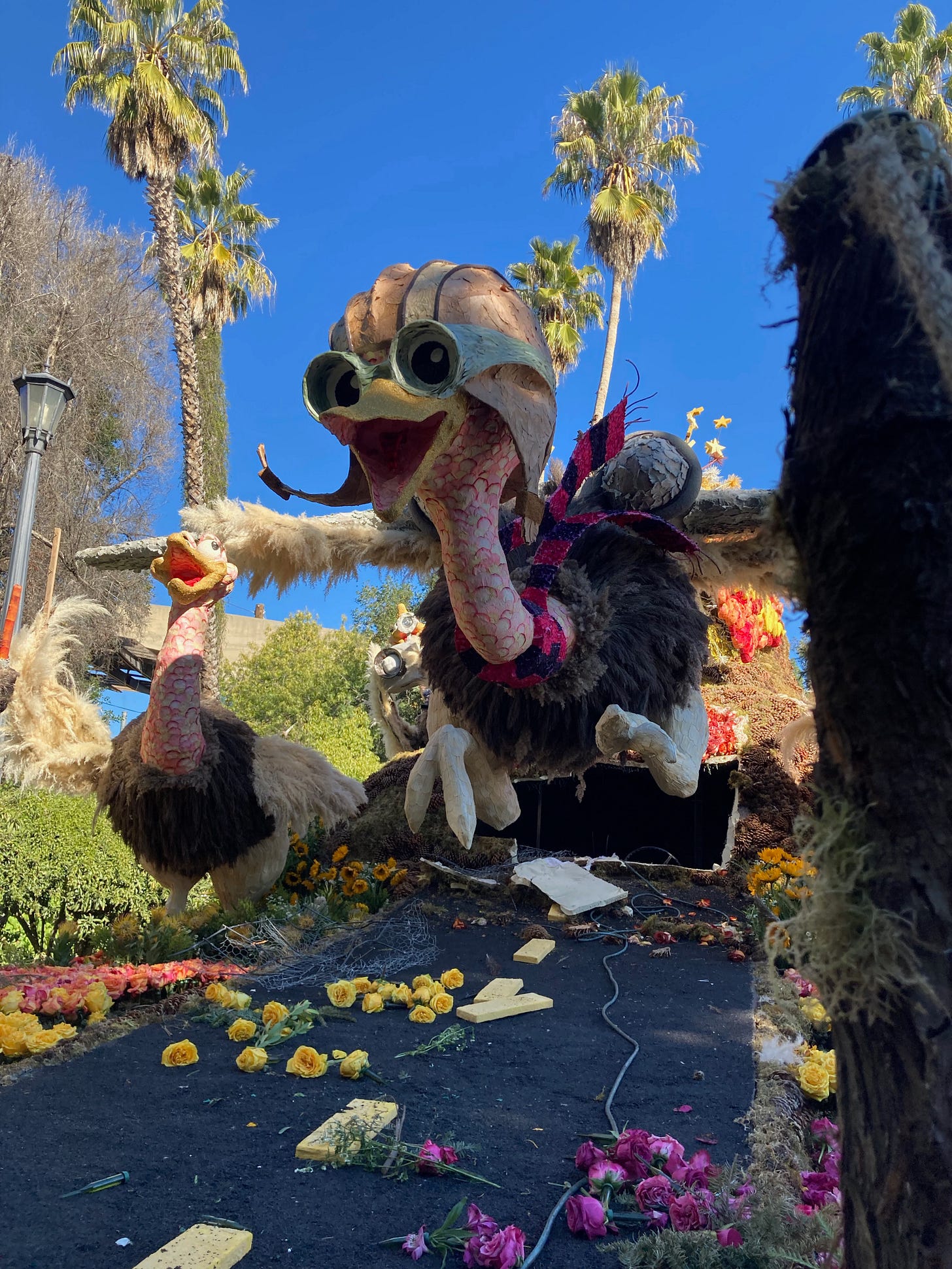Suppression vs Expression
How life works, and how life is crushed and burdened.
I live in a town that borders Pasadena, and the Rose Parade floats drive down my street on New Year’s Eve to line up for the parade. We go out there in the middle of the night to watch them go, standing on the corner with artfully concealed booze and waving at the drivers. Volunteers from the Tournament of Roses race up and down the pre-parade route on tiny motor scooters, looking like an army of Oompa Loompas. There’s never an announcement that the floats will be coming down such-and-such street at such-and-such time to line up for the parade; people just know, and show up. You can look up from the sidewalk and see people clustered around their windows, watching an act of preparation that isn’t designed to be watched.
The float from our own town comes home on the evening of January 2, driving across town like a minivan mixed in with ordinary traffic.
The volunteers who build the thing will spend a few days tearing it down, and they have an artful solution to the problem of removing all those flowers: they leave the float in the parking lot and wait. There’s never an announcement that it’s okay to take the flowers; instead, it’s just a thing that people in town know, and you can watch families wandering home looking like they’ve just robbed a florist. Children stripping flowers off the float look up to see their friends from school doing the same thing; neighbors see neighbors without having planned or coordinated the meeting. Parents tell their children when they’ve taken a reasonable number of flowers and when it’s time to leave the rest for other people, despite the absence of rules that announce those limits. There’s a social order; people know what to do without being told.
Parades have no necessary meaning or value. You can live without them, and you can live without something like a float covered in flowers. I watched the Rose Parade once, and the boredom felt nearly fatal. I don’t care.
But I care about this, because of what it accidentally happens to do along the way. We structure our lives around rituals and acts of gathering that may not have inherent meaning baked inside the form of the event, but that have meaning and value because of the opportunities to get together and do something. We make shit up, and gather around our social inventions, and a few decades of that is all of life. And it’s incredibly enjoyable, for no particular reason, because it gives us structure and human contact — because it’s a series of not-necessarily-meaningful things we do with other people, which is meaningful.
None of this happened last year; there was no parade, so there were no floats, so there was no middle-of-the-night spontaneous assembly of neighbors standing on the corner to watch the floats get into line. It was dismal — dark, empty, dull, sad. But man, were we safe from the COVID.
The spirit of repressive safetyism — of the crushing of life because life is dangerous and it’s better to just stay inside — is an annihilation, a profoundly destructive attack on life itself. It’s death as policy: be safe by severing all of the structure and context of life itself. Never again.
This spirit…

…is an attack. The endless stream of “you can’t say that!” messaging is vicious and anti-human, despite being delivered with a fake smile. The prevailing theme of our media and our politics is about what you can’t say, can’t do, shouldn’t think, must not read. Here is our list of people whose speech should be repressed. It’s death. It’s the spirit of death, wrapped up in a package of “it’s for your own good” and shoved down your throat by people who want to pretend that they’ve given you a gift. This is our moment: spontaneous order fighting against planned and enforced order, open life versus closed life. It doesn’t seem hard to choose a side.


Will be offline for a few days.
So true.